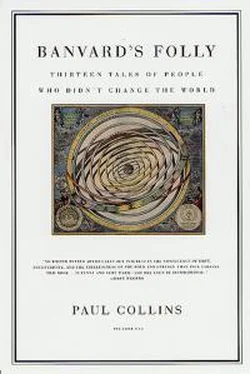Over the next several years, Tupper dallied with a few volumes of more conventional poetry, as well as essays on scientific inventions and morality.
It took time for Proverbial Philosophy to soak into the fabric of Victorian culture, and a second series of the book did not appear until 1842, when the London publisher Hatchard issued it. But for those around Tupper who read the manuscript, there was no question: this volume was his life's work. The author's father, no longer young, read the new poem "Of Immortality" with his own fate much in mind:
I live, move, am conscious: what shall bar
my being? Where is the rude hand, to rend this tissue of existence? Not thine, shadowy Death, what art thou but a phantom? Not thine, foul Corruption, what art thou but a fear? For death is but merely absent life, as darkness absent light; Not even a suspension, for the life hath sailed away, steering gladly somewhere. And corruption, closely noted, is but a dissolving of the parts, The parts remain, and nothing lost, to build a better whole.
His father was, Martin later recalled, "seriously affected" by the lines, and pressed l2,000 upon his son, enough for him to continue writing for some time without fear of poverty. But success was just around the corner for the younger Tupper. The elderly Hatchard family patriarch, wise after many decades in the publishing business, may have been the only one to see it coming.
Meeting his young author for the first time, Grandfather Hatchard placed his hand upon Tupper's dark hair. He had tears in his eyes.
"You will thank God for this book when your hair comes to be as white as mine."
The 1840's wrought an astonishing transformation. Proverbial Philosophy went through nine editions in that decade alone; the following decade saw twenty-eight more editions --and this did not include the innumerable pirated editions. Tupper, the man whose speech infirmities seemed to render him Least Likely to Succeed of his Oxford class, saw himself turned into a de facto poet laureate of Victorian Britain. For an era of moralizing--as every era is, in its own narrow and hopeless way-Tupper's truisms were a comforting balm. He was not a mad, bad, and dangerous-to-know Romantic poet; he could be safely pressed into the hands of any young person or spouse in need of Lessons in Life. During the 1840's and 1850's, Proverbial Philosophy appeared in a bewildering variety of guises-cheap reading editions, gilt gift books, even lavish presentation editions meant to be given to young couples on their wedding day. Copies were given on the birth of children, on anniversaries, on any occasion of importance at all.
Ramble through the Highgate cemetery and you soon come face to face with Tupper--or rather, less disconcertingly, with his words. The man whose thoughts served to mark so many births and marriages also became the poet of eternity, whose words on immortality and divine intention were chiseled into headstones and burial vaults.
It was no small help that Tupper was the Queen's favorite poet. Things had not
started so auspiciously; when Tupper was preparing the second edition of his book, he had asked if he might dedicate it to the Queen. His request was graciously denied by the Court with a letter explaining that "the Queen cannot permit a Second Edition of any work to be dedicated to her Majesty." Still, Tupper's book made its way into the royal quarters, and Victoria and Albert often read it to their children. And as the Queen did, so did her subjects.
Even the country's official poet laureate, Wordsworth, had a copy of Tupper's work; in his declining years he might have wondered whether this young man was to be his successor. And after Wordsworth's death in 1850, Tupper very nearly was the next poet laureate--but, in the end, Alfred Tennyson just barely edged him out. This hardly affected Tupper's stature. In one typical clothing store ad of the day, a lineup of the latest fashions is pictured on a pantheon of the greatest living authors: Browning, Hawthorne, Tennyson, Longfellow ... and Martin Tupper.
Inspired by the Crystal Palace exhibition hall being erected near his home, Tupper made the grandest of poetic gestures in his contribution for the Great Exhibition of 1851: "The Hymn of All Nations." This was a simple hymn, but Tupper had contracted scholars to translate it into thirty languages, including everything from Latin to Arabic to Ojibway: Moonedoo ke ween every gook Noos ke de nah goo me goo ...
As the public's regard for Tupper expanded, so did the author's ambitions.
Tupper poured out a steady stream of patriotic songs, including a Liberian national anthem, moral fables like "The Crock of Gold," essays on subjects ranging from human-powered flight to opium abuse, translations of old English poetry--and, of course, sheaves of his own poetry.
You are a success in the eyes of the world when everyone wants to steal from you--and by that measure, Martin Tupper was the most successful man of his generation. Pirate editions of Proverbial Philosophy sprang up like mushrooms, particularly in America, where the weak laws of copyright made English authors irresistible to publishers. Although the British publications brought Tupper a steady if not magnificent income every year, the only money Tupper ever received from America was $400 from the one Philadelphia publisher who was his official publisher. But scores of knockoff editions were printed in every city; Tupper was amused and a little chagrined to constantly receive in the mail from some admirer yet another unauthorized edition of his own work, and he added each of them to the groaning shelf of Tupper editions in his library.
If Americans had at first been puzzled by Tupper, they now threw their arms around him. On New Year's Day in 1848, a Literary World writer marveled at the poet's ubiquity across the land:
The circulation which the works of Tupper have had in this country, is truly astonishing. A circulation, not confined to cities, towns, or villages, but embracing the entire population. The Proverbial Philosophy is found upon the centre-table of the metropolitan, in the scanty library of the student, and has gone hand-in-hand with the Farmer's Almanac, into the dwelling of the humblest tiller of the soil.
One of the poet's most ardent admirers was an eccentric Long Island newspaper editor named Walt Whitman, who enthusiastically reviewed Tupper's books in the Brooklyn Eagle. Tupper's weighty oracular pronouncements, the breadth of his far-ranging and hypnotic catalogs of flora and fauna, and his free-flowing lines that defied the conventions of poetry and prose alike --these all struck a chord deep within Whitman, who later commented that were it not for Proverbial Philosophy, his own Leaves of Grass would never have been written.
We can also thank Tupper for some of Whitman's worst poetry. Whitman's masterpieces are mixed in with poems of dreadfully boorish nationalism; and indeed Tupper could be both jangling and jingoistic when the occasion demanded it:
Stretch forth! stretch forth! from the south to the north! From the east to the west,--stretch forth! stretch forth! Strengthen thy stakes, and lengthen thy cords,-The world is a tent for the world's true lords! Break forth and spread over every place, The world is a world for the Saxon Race!
As appalling as these lines sound to us now, they did capture the spirit of an era; even without his nationalism, Tupper was still capable of whipping up his reading public with such chest-thumpers as "Cheer Up!" and "Never Give Up!"
Thanks to the dubious magic of copyright piracy, such works achieved an even greater circulation in America than in Britain. It has been estimated that in Tupper's lifetime about 250,000 copies of his work were sold in the United Kingdom, while 1.5 million copies were sold in the U.s. It became clear to Tupper that he would simply have to visit America personally, and so in 1851
Читать дальше











